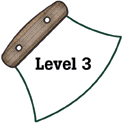
Alaska Science
Key Element B3
A student who meets the content standard should understand that scientific inquiry often involves different ways of thinking, curiosity, and the exploration of multiple paths.
 |
Alaska Science A student who meets the content standard should understand that scientific inquiry often involves different ways of thinking, curiosity, and the exploration of multiple paths. |
|
Performance Standard Level 3, Ages 11–14
|
|
|
|
Sample Assessment Ideas
|
|
|
Expanded Sample Assessment Idea
|
|
Procedure Students will:
Reflection and Revision
|
Levels of Performance |
||
|
Stage 4 |
Student work is complete, correct, and shows evidence of elaboration and extension. Student participates in class discussion and offers insightful examination of their work and the work of others. | ||
|
Stage 3
|
Student work is generally complete and correct. Student participates in class discussion though there may be evidence of misconception in their own work or misunderstanding of the work of others. | ||
|
Stage 2
|
Student work is on topic but lacks detail. Student may participate in class discussion in a limited way and show evidence of misconceptions and misunderstandings. | ||
|
Stage 1
|
Student participation in all aspects of activity is minimal and shows little or no evidence of relevant knowledge or understanding. | ||
Standards Cross-References
|
||
|
National Science Education Standards Recognize and analyze alternative explanations and predictions. Students should develop the ability to listen and to respect the explanations proposed by other students. They should remain open to and acknowledge different ideas and explanations, be able to accept the skepticism of others, and consider alternative explanations. (Page 148) Communicate scientific procedures and explanations. With practice, students should become competent at communicating experimental methods, following instructions, describing observations, summarizing the results of other groups, and telling other students about investigations and explanations. (Page 148) Scientific investigations sometimes result in new ideas and phenomena for study, generate new methods or procedures for an investigation, or develop new technologies to improve the collection of data. All of these results can lead to new investigations. (Page 148) |
Benchmarks Know that hypotheses are valuable, even if they turn out not to be true, if they lead to fruitful investigations. (Page 287) Know that often different explanations can be given for the same evidence, and it is not always possible to tell which one is correct. (Page 287) Be aware that there may be more than one good way to interpret a given set of findings. (Page 299) |
|
Table of Contents | Return to Alaska Native Knowledge Network